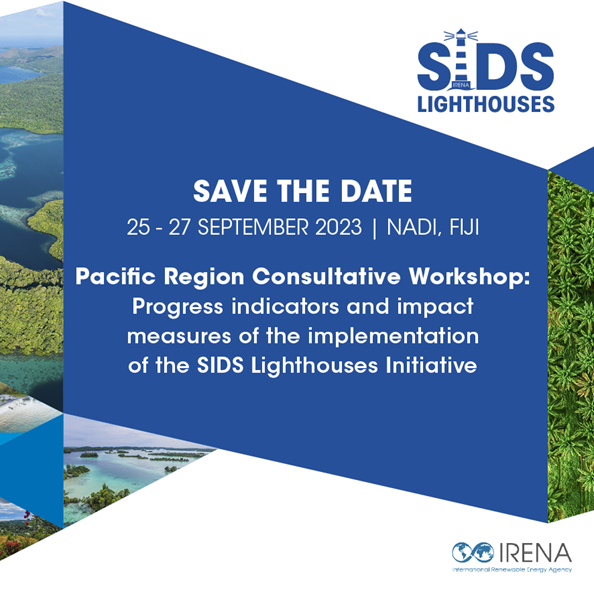
Pacific Region Consultative Workshop: Provision of Development of the progress indicators and impact measures of the implementation of the SIDS Lighthouses Initiative Priority Areas
In 2014, the SIDS Accelerated Modalities of Action (S.A.M.O.A.) Pathway was established, urging Small Island Developing States (SIDS) to commit to their Nationally Determined Contributions (NDCs) under the Paris Agreement. This call to action led to the launch of the SIDS Lighthouses Initiative (LHI) at the 2014 UN Climate Summit, with the aim of advancing renewable energy adoption in island nations. IRENA plays a pivotal role by fostering collaboration among SIDS, development partners, developed countries, SIDS-focused initiatives, and various stakeholders, including private companies and financial institutions.
The initiative identifies twelve priority areas, endorsed in 2018, to support SIDS in implementing sustainable energy strategies, including promoting renewable sources, enhancing capacity development, and expanding the focus beyond power generation. IRENA's role extends to monitoring progress and measuring the impacts of these priority areas at national, regional, and global levels through the development of indicators. The overarching goal is to drive sustainable energy transformation and enhance resilience in SIDS economies.
The primary objective of the inaugural regional consultation workshop in the Pacific region was to introduce and solicit feedback on the draft progress indicators and impact measures developed for the implementation of the SIDS Lighthouses Initiative (LHI). The workshop aimed to achieve consensus on the significance of participating in and reporting on the progress of the SIDS LHI, enhance the reporting competencies of participants, secure agreement on a set of shortlisted indicators and impact measures pertaining to the initiative's twelve priority areas, and facilitate the sharing of experiences related to reporting challenges and capacity requirements.
Targeted participants included representatives from government ministries, the public sector, development partners, financial institutions, and other pertinent stakeholders in the Pacific Small Island Developing States (PSIDS) responsible for overseeing the energy transition and monitoring progress within international frameworks.
